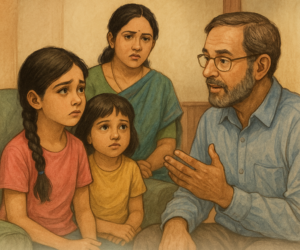By Pranti Pradhan
Rihana’s Song and the Meaning of Love

Rihana was a 13-year-old girl who loved to sing. One day, her teacher at school announced a singing competition. Rihana was very happy. She had been waiting for a chance like this. She rushed home and told her parents.
“Mummy, Papa! I’ve been selected for the school singing competition!”
But instead of being happy, her parents became serious.
“This is not the time for singing,” her father said. “Your exams are near.”
Her mother added, “We want you to do well in studies. Music is not important right now.”
Rihana was hurt. She thought, If they love me, why are they so angry?
She went to her room quietly. Her younger sister Zara followed her, but Rihana didn’t speak. She felt confused and upset.
That evening, her uncle came to visit. He was warm and kind, and Rihana loved talking to him. When he saw her quiet, he asked, “Rihana, what’s wrong?”
Rihana looked at him with sad eyes. “Uncle,” she said, “I love singing. But when I told Mama and Papa, they got angry. If they love me, why do they get so angry?”
Her uncle sat beside her and spoke gently.
“Rihana, that’s a very good question. First, do you know what true love is?”
Rihana was silent.
“Real love,” her uncle explained, “means giving your heart, your mind, your whole being to someone or something without asking for anything in return. When there is such love, there is no anger.”
“But,” he continued, “most people don’t love in that way. Your parents love you, but they also expect something from you. They want you to study well, to get a good job, to become successful. When you do something they don’t agree with, like singing during exam time, they feel disappointed—and then, they get angry.”
“So they are not angry because I love music?” Rihana asked.
“No,” he said. “They are angry because they have an idea in their mind about what you should do. When you don’t match that idea, they feel hurt. That hurt becomes anger. They are depending on you to fulfill their hopes.”
He paused and added, “When we depend on someone for our happiness, we start expecting. And when expectations are not met, we get angry, jealous, or sad. That’s why it is important to love something with your whole heart—not to get something, but just because you love it.”
Rihana listened carefully.
“So, if I love singing truly,” she asked, “should I still sing, even if they’re not happy?”
Her uncle smiled. “Yes, sing with your whole heart. Not to prove anything. Not to win. But because singing brings you joy. That is pure love. And don’t worry—I will talk to your parents about the competition. They love you. They just need to understand.”
Rihana felt lighter. She thanked her uncle and quietly went back to practice her song.
On the day of the competition, she sang not to impress anyone, but because she loved music deeply. Her voice was full of honesty. And even though her parents had been upset before, when they saw her sing with such joy, something changed in their hearts.
Later that evening, her father said softly, “You really love music, don’t you?”
Rihana nodded.
Her mother smiled. “Maybe we were too quick to judge. We’re proud of you.”
Rihana smiled too—not because they praised her, but because she had understood something deeper about love, anger, and freedom.
🌟Moral of the Story🌟
When love is full of expectations, it brings anger. But true love is free—it gives without asking. And when we love something with our whole being, we find peace, not conflict.



